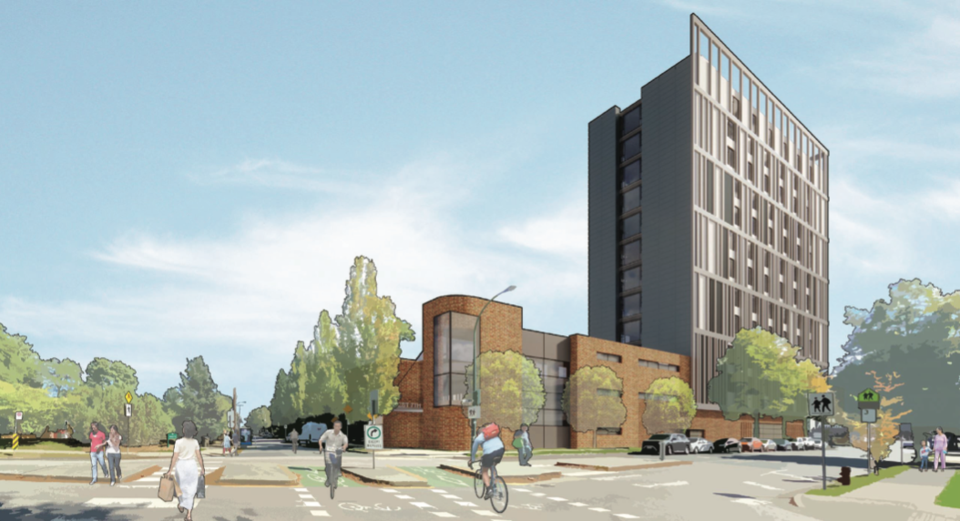A controversial proposal for a 13-storey tower in Kitsilano containing 129 social housing units goes before city council Tuesday (June 28) as supporters and detractors continue to line up to ensure their voices are heard at the public hearing.
As of Monday morning, 171 people had registered to speak at the hearing, which begins at 6 p.m. and is expected to continue over several days. The project is proposed for a city-owned site that runs a block long between Seventh and Eighth avenues at Arbutus Street.
If approved, each of the studio apartments would go to a combination of people without homes, at risk of homelessness or those displaced from low-income housing, as well as citizens who may be working and earning low incomes.
“Approximately half of the units would be operated as supportive housing with on-site and embedded support services for residents and the other half will be deeply affordable social housing for residents who are ready and able to live more independently,” according to a city staff report.
St. Augustine elementary
Supportive housing means tenants who need it will have access to mental health care, substance use services that could include a safe consumption room, education, life-skills training and help accessing income assistance, disability benefits and pensions.
The project is controversial for reasons outlined by several hundred residents concerned about the site’s location to St. Augustine elementary school, a women’s recovery home and “safety concerns” related to the tenant mix.
The Kitsilano Coalition held a recent public rally against the proposal and has circulated frequent news releases, arguing that congregating people living with mental health and addictions issues in one building doesn’t work.
'Mentally unwell and addicted'
In one of its news releases, the coalition featured Simon Fraser University’s Dr. Julian Somers, a clinical psychologist and international expert on public policies related to addiction and mental health.
Somers said people with mental illness and addiction have limited opportunities to recover when they are forced to live with others who struggle with the same issues.
“When they are asked, the vast majority prefer independent housing,” he said. “Clinical experience and evidence clearly demonstrate that if you concentrate people who are mentally unwell and addicted into a single building the chances of success are virtually non-existent.”
Drug consumption room
On Monday, the coalition issued another release, quoting Sharon Dobin, the president of the Sancta Maria House Society, which operates the women’s recovery home adjacent to the proposed site.
“Many of the women who come to us are escaping people and places that hurt them,” Dobin said.
“Anything that jeopardizes their recovery concerns me. The proposed development would not allow residents to move in with children. As well, a building with a common use drug consumption room is difficult for our women to reside near, given they are just overcoming these challenges themselves.”
MLA support for project
Council’s agenda for Tuesday’s hearing showed 376 pieces of correspondence received from citizens opposed to the project. Another 90 registered their support, including Vancouver-Fairview MLA George Heyman and Margaret Pfoh, CEO of the Aboriginal Housing Management Association.
Heyman said he and his NDP colleagues were elected on a mandate to address the housing crisis. He said no one is more profoundly affected by the crisis than people without homes and those at risk of losing a home.
“This project and others like it will benefit all of us and our city,” Heyman said.
“Creating safe, inclusive communities for everyone means there are fewer people outside, struggling to survive, without the supports they need to address multiple needs in their lives. It is particularly important that our neighbourhoods are inclusive and open to everyone.”
Pfoh echoed Heyman’s push to open more housing for people living on the street and those at risk of losing a home, particularly Indigenous peoples, who continue to be overrepresented in homeless counts in Vancouver.
Women transforming cities
The nonprofit Women Transforming Cities wrote a recent blog post on its website in support of the project, arguing affordable housing continues to be the top concern raised by respondents to surveys the organization conducts.
The nonprofit pointed out the next civic election is Oct. 15 and urged citizens to monitor how the current council votes on the project — and how candidates vying for a seat respond to the decision.
“If you want to know which sitting councillors are serious about tackling the housing crisis over the next four years, watch how they vote on a supportive housing initiative at 8th and Arbutus,” said the post authored by Clara Prager and Mahtab Laghaei.
“The project represents the challenges of building affordable housing in wealthy neighbourhoods — and council’s decision will indicate whether they believe that people of all socio-economic backgrounds belong in all areas of the city.”
Homeless count
If the project is approved, approximately 50 per cent of the units would rent at the $375 per month shelter component of income assistance.
The balance of the units would rent at rents-geared-to-income from $375 up to an income limit of 50 per cent of BC Housing Income Limits — currently $28,750 per year gross household income and a rent of $719 per month.
The Vancouver Affordable Housing Agency is the applicant for the project and has indicated the tower will be “passive house-certified,” which means it would consume up to 90 per cent less heating and cooling energy than a conventional building.
The tower will be built using modular, pre-fabricated units to reduce construction time.
Vancouver last conducted a homeless count in March 2020 and found 2,095 people were without a home. City staff has since said the pandemic and other factors may have increased the homeless population in Vancouver.
@Howellings



